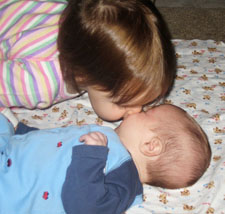Originally published on July 30, 2009 at m a m a :: m i l i e u.
Okay, yes those are lyrics to a 1985 Sting song, but they rang oh-so-true today when I came across a quote on my igoogle page. I have a daily literary quote rss feed on my google homepage. Yesterday, it featured a quote from American Poet, Mary Oliver, and all I could think about after reading it was “that lady must have kids.”
The quote went something like this:
“To live in this world, you must be able to do three things: to love what is mortal; to hold it against your bones knowing your own life depends on it; and, when the time comes to let it go, to let it go.”
I hate to reveal that it was only after watching “Benjamin Button” recently that I first had a paralyzing realization that I was indeed mortal. No, I didn’t think that I was a superhero or a downy white unicorn bathed in light before watching the film, I just hadn’t really given the dreary subject much thought.
It wasn’t until seeing poor ol’ Benji aging in reverse–from a wrinkled and crippled infant to a wrinkled and crippled old man–that I truly came face-to-face with the fact that I am nurturing the next generation–someone who will only be budding into puberty just as I will be waning into the second half of life. I will be grey and he will be pimply. I will be mom and he will be my rebellious teen. I will be Grandma and he will be Dad. I will be a memory and he will be Grandpa.
Your 20’s aren’t really a time when you waste much energy thinking about your inevitable and eventual end–you are just beginning what will hopefully be a long and successful life as an adult. Not even turning 30 this year changed all of that.
Having a baby did, however. Now, several times a day, I am saddened by the reality of time’s quick passing. At nights when I am rocking my sweet suckling baby as he drinks and sniffles at my breast, I already envision the time, not very far off from now, when those gentle quiet moments of pure raw love and mutual dependence will come to an end.
And my breast will eventually return to me. And from my breast, I will have to let him go. On to a sippy cup. On to a big boy cup. On to a fork and spoon.
While my eye is pressed to the camera’s viewfinder, I can feel time ticking each minute into the past and imagine my husband, myself and our son years from now watching what I am recording at that moment–laughing at our “dated” hair styles, cars, furniture, clothes–things which are for us now new and modern.
And, our home will return to us. And from our home, we will have to let him go. On to college. On to his own home. On to his own life.
There will come a time that I will have to let him go–let him flutter on without my constant guidance, nurturing, or intervention. And the time is coming sooner rather than later. The independence has already begun. I am preparing now for the”letting go”.
——-
Joni is a first time mommy, former teacher and lover of all things writing and cooking. She enthusiastically blogs about the pleasures and perils of natural mommying and wholesome organic cooking for your little foodie over at: www.mamamilieu.blogspot.com and www.feedinglittlefoodies.blogspot.com.

 I had many afternoons on the floor holding Alex, laying next to Emily and all three of us sobbing in unison. They were crying because they couldn’t communicate and were in pain and I was crying because I thought I lost my daughter. Days later, I saw a glimpse of her, I saw a fighter. I saw who she really was, peaking through that Autism armor she was wearing. She wasn’t giving up and neither could I. Instead of “Why me? Why Emily? Why us?” my thoughts quickly became, “Autism? BRING IT.”
I had many afternoons on the floor holding Alex, laying next to Emily and all three of us sobbing in unison. They were crying because they couldn’t communicate and were in pain and I was crying because I thought I lost my daughter. Days later, I saw a glimpse of her, I saw a fighter. I saw who she really was, peaking through that Autism armor she was wearing. She wasn’t giving up and neither could I. Instead of “Why me? Why Emily? Why us?” my thoughts quickly became, “Autism? BRING IT.” 